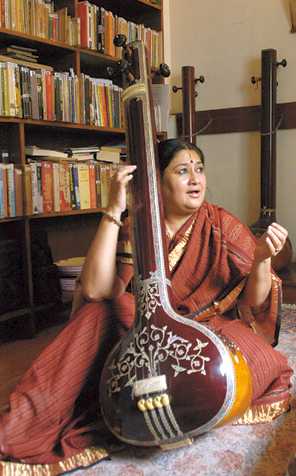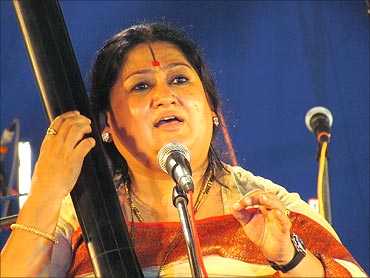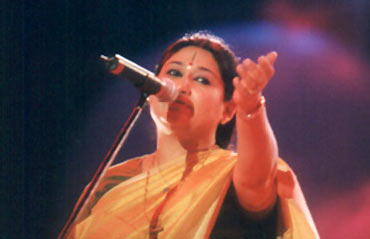
Suraj Anand caught up with the artiste in Pune where she curated the music festival, Baaja-Gaaja 2011. She feels that India should encourage arts amongst the young on an urgent basis.
What prompted the shift from dance to vocals?
I tried learning thumri singing, an integral part of a Kathak dancer's training. I soon realised that I needed training and was drawn to studying vocal music. I was accepted as a disciple by Late Pandit Ramashreya Jha in Allahabad. I soon got so engrossed in studying vocal music that I abandoned dance.
I started singing professionally in the early '80s, largely for concerts featuring upcoming or 'navodit' artistes.
Tell us about your first job.
I worked as a temporary announcer for Vividh Bharati programmes on All India Radio (AIR) station in Allahabad, and bought my first Miraj tanpura from the fee. I still have it with me.

Was your family supportive?
Through all these journeys I was guided by my wonderful parents Jaya and Skand Gupt who shared a passion for music and the arts. My sister Ragini remains a constant support -- even sorting through thousands of compositions I have scribbled on scraps of paper, left uncatalogued for years. My husband Aneesh Pradhan is a wonderful teacher, guide, soulmate, and my son Dhaval and nephew Raghav also enrich my life.
Your most memorable concert...
It has to be the Radio Sangeet Sammelan concert which I sang and recorded in Jaipur to be broadcast, about six years ago. But I did not have the courage to inform my guru Pt. Ramashreya Jha about the date of broadcast. He happened to listen to it and sent me a letter saying he was happy to see that I had paid good heed to what he taught me. His approval, more than the concert, is truly memorable for me.
You said that the music profession can make one insecure...
Yes, because of the uncertainty -- how many concerts, if any at all, the fee, and there is no standard method of evaluating success or progress. For some people, the number of concerts you perform or the number of times you are mentioned in Page 3 is a measure of success. To others, measures of success may be completely different -- for example, how many compositions you are able to remember without having to refer to a notebook.

What are the challenges you face...
The challenge is not to be drawn towards imitating, to keep learning and recognising one's limitations. The study of music is humbling. It constantly teaches you how little you know and on the other hand, admiration and adulation from audiences can make you heady or smug for at least some time.
The challenge lies in remaining crazy about the music and not oneself.
Your opinion on the state of music training in India.
A recommendation to include arts education (including music) in mainstream school curriculum has been accepted by the Central Advisory Board for Education over five years ago. Still little has been done to implement that recommendation.